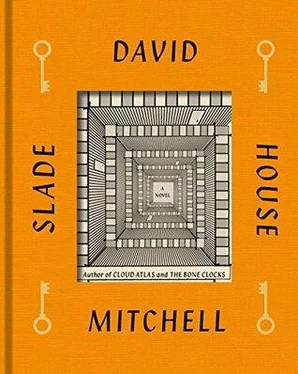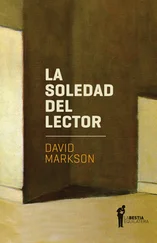David Mitchell - Slade House
Здесь есть возможность читать онлайн «David Mitchell - Slade House» весь текст электронной книги совершенно бесплатно (целиком полную версию без сокращений). В некоторых случаях можно слушать аудио, скачать через торрент в формате fb2 и присутствует краткое содержание. Год выпуска: 2015, Издательство: Random House, Жанр: Современная проза, на английском языке. Описание произведения, (предисловие) а так же отзывы посетителей доступны на портале библиотеки ЛибКат.
- Название:Slade House
- Автор:
- Издательство:Random House
- Жанр:
- Год:2015
- ISBN:нет данных
- Рейтинг книги:3 / 5. Голосов: 1
-
Избранное:Добавить в избранное
- Отзывы:
-
Ваша оценка:
- 60
- 1
- 2
- 3
- 4
- 5
Slade House: краткое содержание, описание и аннотация
Предлагаем к чтению аннотацию, описание, краткое содержание или предисловие (зависит от того, что написал сам автор книги «Slade House»). Если вы не нашли необходимую информацию о книге — напишите в комментариях, мы постараемся отыскать её.
) comes a taut, intricately woven, spine-chilling, reality-warping short novel. Set across five decades, beginning in 1979 and coming to its electrifying conclusion on October 31, 2015,
is the perfect book to curl up with on a dark and stormy night.
Slade House — читать онлайн бесплатно полную книгу (весь текст) целиком
Ниже представлен текст книги, разбитый по страницам. Система сохранения места последней прочитанной страницы, позволяет с удобством читать онлайн бесплатно книгу «Slade House», без необходимости каждый раз заново искать на чём Вы остановились. Поставьте закладку, и сможете в любой момент перейти на страницу, на которой закончили чтение.
Интервал:
Закладка:
yr guest parked 50m from Westwood Road
entrance to alley, navy blue VW Tiguan.
I reply concisely:
ok
Our operatives are masters of their martial craft and need no further orders. I half feared the wintry weather might delay our guest, or even deter her from making the car journey altogether. Turning a no-show into a show would have complicated the day in tense, unpleasant ways, but instead, our guest is a quarter of an hour early and we can afford to relax a little. On a whim, I locate Philip Glass’s music for The Truman Show on Bombadil’s iPhone, and listen to it by way of pre-prandial entertainment. Jonah and I saw the film at a backstreet cinema in St. Tropez at the turn of the century. We were moved by the protagonist’s horror at the breadth and depth of the gulf between his own life and the quotidian world. The Côte d’Azur could be the right sanctuary for Jonah to spend a few weeks after nine static years in his wounded body. The Riviera has no lack of privileged hosts whose hair Jonah could let down, and I would enjoy the sunshine on a host’s skin after five days of this absurd weather. A moon-gray cat appears at Bombadil’s feet, miaowing for food. “You’re not as hungry as we are,” I assure it. The wind slams down Slade Alley, flurrying sleet and leaves in its roiling coil. I zip up Bombadil’s hood to protect his earphones, restricting my view to a fur-lined oval, and think of sandstorms at the Sayyid’s house in the Atlas Mountains. How the century hurtled away. The cat has given me up as a lost cause. Bombadil’s toes are numb in his flimsy trainers, but he’ll be dead before his chilblains can bloom. My conscience rests easy.
A short, slim figure, bulked out by cold-weather clothing, walks down Slade Alley, backlit by sleet-whitened, hurrying light. Doctor Iris Marinus-Levy is a psychiatrist from Toronto on a placement at Dawkins Hospital, outside Slough. Two twists of fate set her on the path that leads to our Aperture. The first is that in 2008 she obtained the notebooks of Fred Pink, the former Dawkins patient who died in 2005. She wrote a series of academic papers on abduction psychoses, drawing from the notebooks, in which she describes Pink’s obsession with Jonah and Norah Grayer, a pair of long-dead “soul vampires.” The second twist of fate is that Iris Marinus-Levy is, against quite delicious odds, an Engifted herself, and is therefore fair game. The Mighty Shrink proved absurdly easy to lure here. She stops, a few paces away; a black professional in her late thirties — a smooth, sub-Saharan, black-leather-jacket black that sharpens the whites of her eyes and teeth. Marinus dresses dowdily for work, and even off duty she hides her figure under mannish clothes: a sheepskin flying jacket, rumpled trousers, hiking boots, a moss-green beret, a keffiyeh around her neck and little or no make-up. She wears her wiry hair short. A khaki canvas bag is tucked under her shoulder. Calmly, she sizes up Bombadil, a skinny Caucasian in his early twenties, with bad skin, an ill-advised lip-stud, a sharkish chin, a cheesy smell, and sore eyes. My host is swallowed up by his XXL ski jacket. Iris Marinus-Levy, PhD, sees her next research subject, her Fred Pink the Second, and this one, she gets to meet in the flesh. I unplug Bombadil from his headphones and have him give Marinus a Got a problem? face.
She recites the first line of the word-key: “Yes, I’m looking for a pub called The Green Man.” Her voice is deep, clear and has an accent that used to be labelled “mid-Atlantic.”
Bombadil has a muttery, wandering Estuary English accent I leave the way it is: “No. The Green Man’s gone the way of The Fox and Hounds.”
Iris Marinus-Levy offers her gloved hand. “Bombadil.”
I feel the prickle of psychovoltage, even through her cashmere gloves. “Doctor Iris Marinus-Levy.”
“Nine syllables wears you out. ‘Marinus’ is fine.”
I notice the blue checks of her keffiyeh are in fact half-centimeter-wide Stars of David. What a smug piece of symbolism. Our handshake ends. “Isn’t that, like, calling you by your surname?”
The Mighty Shrink duly notes my nomenclatural sensitivities: “Marinus is more of an inner name than a family name.”
I have Bombadil shrug. “Welcome back to Slade Alley, Marinus.”
“Thanks for reaching out to me.” She knows better than to ask for my real name. “Your emails were fascinating.”
“Thought it’d broaden your mind, seeing a real live orison, like.”
“I’m curious to see what we’ll see, Bombadil. Say, this wind’s sharp as a razor. Would you prefer to talk where it’s warmer? I’m parked just on the street, or I passed a Starbucks at the Green. Did you have lunch already? I’m buying.”
“I never talk where I haven’t swept for wires,” I tell her.
Marinus makes a mental note of this. “I understand.”
I nod along the alley. “Let’s jump in at the deep end, like.”
“Go straight inside the ‘orison’ you mean?”
“Yup. Still there. I went in yesterday, too.”
“So that’s once on Thursday, and yesterday? Twice in total?”
“One and one is two.” I nod, amused by her professional demeanor. “They don’t happen along very often.”
“And the way in, the ‘Aperture,’ it’s still”—she looks along the claustrophobic middle section of Slade Alley—“down here?”
“Sure is, Doc. Exactly where you said Fred Pink said Gordon Edmonds said he found it, all those years ago.”
Marinus marvels that this gawky geeky English boy reads the American Journal of Psychiatry . “Lead the way.”
Twenty paces later we stop at the Aperture, and for the first time our guest is flummoxed. “It’s small, it’s black, it’s iron,” I enjoy spelling out the obvious. “Just as Fred Pink said.”
Marinus touches it. “There wasn’t a door here three years ago.”
“There wasn’t a door here three days ago. But when I did my post-dawn recce on Thursday morning, voilà .”
Marinus looks up and down the alley, then crouches down to inspect the sides. “Looks as if it’s been here for years. This lichen, this scuffed concrete …”
“Apertures are chameleons, Doc. They blend in.”
She looks at me, her faith in a logical explanation shaken but as yet intact. “What’s on the other side?”
“That’s the cool bit. Look over the wall with a twelve-foot ladder, you see this …” I have Bombadil produce a photo from an inner pocket. “The back garden of a semi-detached house, built in 1952, home to Jamal and Sue al-Awi and their two point four children — literally, she’s in her second trimester, according to her hospital records. But if you go through the Aperture”—I rap the soundless surface with my knuckles—“you’ll find the terraced garden of Slade House, as it appeared in the 1930s, on a foggy, mild day.”
Marinus gives me an assessing look.
“The fog was a total surprise,” I tell her.
Marinus is wishing she was recording all this. “You mean the same Slade House which got razed in the Blitz, in 1940?”
“December twentieth, 1940. Just in time for Christmas. Yes.”
“So are you saying this door’s a kind of … time-portal?”
“No, no, no, that’s a classic mistake. An aperture’s a portal into an orison. A reality bubble. God, I wish you could see your face, Doc.”
The Mighty Shrink looks shifty and puzzled. “I have faith that you believe, Bombadil, but science requires proof. As you know.”
“And proof requires reliable witnesses,” I have Bombadil answer, “ideally with a PhD after its name.” The wind bounces a plastic bottle off the floor and walls of the alley. We stand aside to let it pass. Tall weeds sway.
Читать дальшеИнтервал:
Закладка:
Похожие книги на «Slade House»
Представляем Вашему вниманию похожие книги на «Slade House» списком для выбора. Мы отобрали схожую по названию и смыслу литературу в надежде предоставить читателям больше вариантов отыскать новые, интересные, ещё непрочитанные произведения.
Обсуждение, отзывы о книге «Slade House» и просто собственные мнения читателей. Оставьте ваши комментарии, напишите, что Вы думаете о произведении, его смысле или главных героях. Укажите что конкретно понравилось, а что нет, и почему Вы так считаете.












